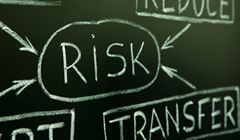 Supply-chain risk is mentioned with some frequency in ERM, and it is hard to speak about it today without considering the effects and potential effects of current geopolitical instability. In fact, geopolitical risk was the top supply chain–related risk mentioned by members of the NeuGroup’s Corporate ERM Group meeting this year in the group’s pre-meeting survey.
Supply-chain risk is mentioned with some frequency in ERM, and it is hard to speak about it today without considering the effects and potential effects of current geopolitical instability. In fact, geopolitical risk was the top supply chain–related risk mentioned by members of the NeuGroup’s Corporate ERM Group meeting this year in the group’s pre-meeting survey.
One member company that has been around more than 100 years shared its approach to geopolitical risk, which also covered some of the longstanding and nascent supply-chain risks members are grappling with, as well as the domestic and foreign affairs that could influence them in the future.
One lesson from this company was to “look before you leap.” The company’s 100-plus years of operation the fact that it now operates nine countries proves that it has weathered a lot of crises. Indeed, the nature of its business is so capital-intensive and government-linked that it is crucial for the company to have a thorough understanding of what they are getting into before entering a new country. Consequently, the company performs a robust review process that involves review and input from some 15 different groups within the company such as legal, government affairs, tax and procurement, to name a few.
The review is intended to identify all risks on the ground that could have an adverse impact on the business. To supplement their assessment, the company takes advantage of intelligence data providers such as Maplecroft and Business Monitor International.
Another lesson, says the ERM manager is that, “the local government is always a business partner.” Like it or not, this statement is true and the relationship must be managed effectively. The manager notes that trying to “strong-arm a government” is never effective. As such, the company makes it a point to conduct humanitarian projects where it operates to build goodwill. He also notes that the in-country leadership engages with the local government and the company works closely with key US government agencies such as the FBI and NSA to assess risks in countries. This might be beyond the needs of other companies in the group, but these agencies can be used as a resource.
Where’s the source?
Sourcing supplies carefully and strategically is critical, according to a discussion about managing suppliers. One member from a tech company offered several insights into that management.
- Don’t manufacture your latest technology in China because it is likely to be stolen.
- Don’t allow any single product to be manufactured in only one factory.
- Don’t rely on any single supplier—dual source all supplies.
- Watch your ecosystem. After tsunamis in Thailand and Japan, the tech sector in particular has learned a lot about mitigating supply-chain risk.
- Don’t hesitate to leave a location if needed. This member noted that her company left the one Southeast Asian country because trucks of products were being hijacked.
- “Keep your friends close but your enemies closer.” Exemplifying this famous quote from The Godfather, this member noted that her company has started partnering with local competitors in China. Further, as was noted in an earlier session presentation, it is common practice in certain industries to partner with competitors in order to mitigate sovereign risk.
There is no reason to believe supply-chain and geopolitical risk will become any less of an issue going forward. Therefore, members’ companies will need to continue to continually perform their equivalents of AGRA’s throughout their supply chain and geography. Partnering with competitors could be a bit much for some companies, but it is an activity that occurs routinely in a number of industries such as oil and gas, engineering and construction and banking, all for the purpose of spreading risk and in some cases watching each other’s back.